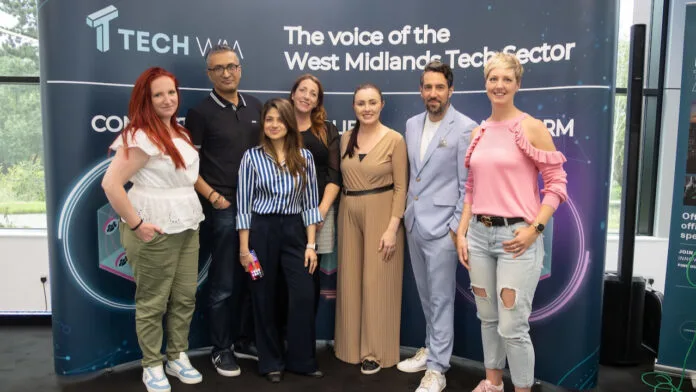Changes at the top of TechWM set to see growth in the West Midlands

By Molly Matthews
2 minutes 57 seconds
Press Release
Share:
Quick Read: TechWM, the leading not-for-profit organisation dedicated to driving tech innovation in the West
Midlands, has announced a new Chairman alongside the appointment of new board members.
Bringing over 40 years’ collective industry experience, this board expansion comes as the
organisation celebrates significant growth in revenue and ahead of the sixth annual Birmingham
Tech Week.
TechWM, the leading not-for-profit organisation dedicated to driving tech innovation in the West Midlands, has announced a new Chairman alongside the appointment of new board members. Bringing over 40 years of collective industry experience, this board expansion comes as the organisation celebrates significant growth in revenue and ahead of the sixth annual Birmingham Tech Week.
Jason Sahota, a seasoned technology and business leader and Private Equity Advisor, will be taking the role of chairman of the TechWM board. With over 20 years of experience, Jason carries an impressive portfolio of NED and advisory positions that focus on technology start-ups and scale-ups in the West Midlands region.
Jason will replace Kim Leary, who remains on the board having been in the chair position since 2020. Speaking about his appointment, Jason comments:
“There’s no doubting the opportunity that lies ahead for the region’s tech scene. Every year, we go from strength to strength and that is largely down to the vision and strategic direction set by TechWM. Picking up the baton as chair is an incredible honour, and I cannot wait to get started in pushing towards our collective vision of being a recognised global tech superpower by 2030.”
Kim Leary is a founding member of the TechWM board, having joined after the first Birmingham Tech Week. She will remain on the board, commenting:
“I stepped into the Chair role at a time when Birmingham Tech Week was in its infancy because I truly believed in its purpose. That was nearly five years ago, and naturally, the time has come for me to step down as chair. However, I will remain a board member because that belief still burns strong, and I know there is more to do.

TechWM has achieved so many successes and has become a vital part of the tech ecosystem here in the West Midlands. However, personally speaking, I am most proud of the role I have played in transitioning the board from being very operational to the diverse and strategic force it is now.
We have a wonderful team in place, and I am confident that the organisation will continue to thrive and make a significant impact in the years to come.”
In addition to Jason’s appointment, TechWM has also welcomed new board members including: the new Vice Chair, Elizabeth Zeddie Lawal, an award-winning creative producer and founder of CreaTech organisation, More Than A Moment; Joanna Birch, Chief Innovation Officer, Woodbourne Group; and, Daniel Campion, co-founder and CEO of Infrastructure SaaS platform, Sitenna.
Bringing over 40 years of combined business and tech experiences, the newly appointed board members offer diverse perspectives and expertise across telecoms, M&A, strategic innovation, cultural industries, and global client relations; enhancing TechWM’s support of the region’s tech community.
This expansion comes at a time when TechWM is celebrating significant growth, with revenue increasing by 78% between July 2023 and July 2024. A new Director of Digital Skills & Commercial Impact, Victoria Pargetter-Garner, will also be joining the TechWM team, who will play a crucial role in developing the region’s digital talent.
Having worked at the University of Birmingham for over a decade in business engagement roles, being the facilitator between academia and industry for up-skilling and innovation, Victoria comments:
“I’m delighted to be joining the TechWM team on its exciting growth trajectory. The West Midlands motto is ‘making tech succeed in the most human of places’ – this couldn’t be more appropriate than when looking at the digital skills agenda.
Ensuring that we have the right skills base for the short, medium and long term are fundamental to the growth of the region’s burgeoning tech sector, as well as that of the economy more broadly. I’m looking forward to working with employers and education providers to ensure we have the right digital skills to reduce the current skills gap and create a thriving tech ecosystem for the West Midlands.”
Building on its ongoing momentum, including powering the high-profile ‘One to Win’ pitch competition, which will see £1 million reward to the region’s most promising start-up business, and launching a standout Birmingham Tech Week 2024, TechWM is scaling up its operations to accelerate the region’s tech ecosystem to become a Global Tech Superpower by 2030.

Proudly Backed By Our Patrons














